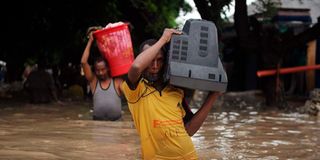Lights flashing red on climate dashboard, UN study warns

Smoke rises from a wildfire in the forested hills of the Kabylie region, east of the capital Algiers, on August 10, 2021.
Human activities are to blame for changing the climate in stark and sometimes irreversible ways, a landmark study by the Intergovernmental Panel on Climate Change (IPCC) has said.
Worse, the IPCC scientists warn of increasing droughts, heat waves, flooding and crossing of the global temperature warming level of 1.5 degrees in just over 20 years.
However, the report approved on August 9 by 195 member governments of the IPCC, says disaster can be averted if urgent actions are taken, especially “strong and sustained reductions in carbon dioxide emissions and other greenhouse gases.”
Responding on Twitter after the release of the report, Climate Change 2021: the Physical Science Basis, UN Secretary-General Antonio Guterres reaffirmed the scientists’ findings, saying: “The evidence is irrefutable: greenhouse gas emissions are choking our planet & placing billions of people in danger. Global heating is affecting every region on Earth, with many of the changes becoming irreversible. We must act decisively now to avert a climate catastrophe.”
Future climate
“This report is a reality check,” IPCC Working Group I Co-Chair Valérie Masson-Delmotte said, adding that it provides a clear understanding of the past, present and future climate.
Climate change is not just limited to temperature, but to other variations in different regions, which will all intensify with further warming, the scientists warn.
Among the observed changes is the intensification of the water cycle, which is expected to bring more intense rainfall and associated flooding as well as droughts in many regions.

Serbian firefighters use a water hose to extinguish the burning blaze of a forest fire in the village of Glatsona on Evia (Euboea) island, on August 9, 2021.
In Africa, failure to limit warming to close to 1.5 degrees could adversely affect agricultural productivity, hampering the ability of the continent to feed its growing population as rainfall patterns are affected.
“Climate change impact on Kenya and Africa can be seen and felt by all. Delayed rains or drought are no longer in the future but with us now. We must act now or never. We need action across government, business, non-state actors and Kenyans at large through adaptive and mitigative actions,” said World Wide Fund for Nature-Kenya (WWF-Kenya) Ag. Head of Conservation Programmes, Jackson Kiplagat.
Some of the changes set in motion that are irreversible, at least “over hundreds to thousands of years” include the continued sea level rise which will occur throughout the 21st century, contributing to more frequent and severe coastal flooding in low-lying areas and coastal erosion.
The scientists warn that impact on the ocean, including warming, more frequent marine heatwaves, acidification and reduced oxygen levels-- activities clearly linked to human influence -- will continue throughout at least for the rest of this century.
“The coastal communities dependent on fisheries for livelihood are already facing frequent increased disasters that include strong winds and related accidents. And as the mangrove ecosystems are affected by increased freshwater due to floods, it means the breeding areas of the fish will be no more, with direct negative effect on fish catch.
On the other hand the coastal towns and shoreline developments which are mostly associated with the tourism industry may suffer from the coastal flooding partly or completely due to the sea-rise phenomenon,” said Dr. Mohamed Pakia, WWF-Kenya’s Coastal Kenya Programme Terrestrial Coordinator.

A man carries a television through waist-deep flood water in Mogadishu on May 20, 2018.
The findings, which are endorsed by the world’s governments, come at least three months to the 26th UN Climate Change Conference of Parties (COP26) in Glasgow, Scotland, United Kingdom.
The COP26 summit brings parties together to speed action towards the goals of the Paris Agreement and the UN Framework Convention on Climate Change.
Alok Sharma, President of COP26, said the IPCC report shows “the lights are flashing red on the climate dashboard,” and called on parties to commit to ambitious reduction targets at the Glasgow summit.
The IPCC is an organisation created in 1989 by the World Meteorological Department and United Nations Environment Programme to provide regular assessments of the scientific basis of climate change, its impacts and future risks and options for adaptation and mitigation. Its findings are endorsed by the world’s governments.





